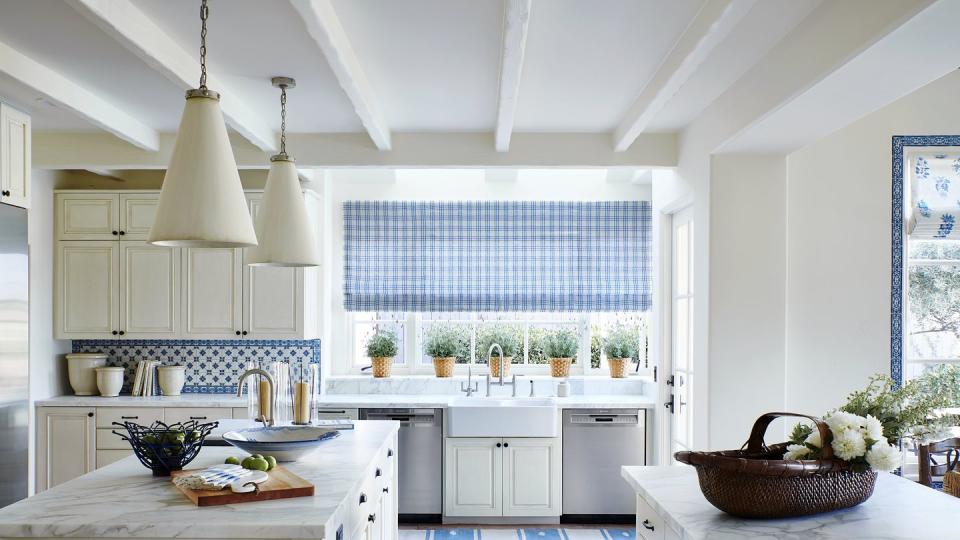8 Ways to Bring Feng Shui Principles Into Your Home, According to Experts

We’re all looking for ways to improve our lives through our homes, whether it’s to beautify the spaces, make daily life easier to tackle, or to improve our mental health. While adhering to a certain design style and weaving in antiques and other beloved objects is certainly one way to give our spaces a lift, you can also consider how the “energy,” or general atmosphere, feels in your home.
There is a home design approach that’s been around for centuries and focuses on inviting good energy into your abode. It’s called feng shui, a term you’ve likely come across, and it can reportedly help make your home feel even better.
What Is Feng Shui?

Simply put? “Feng shui is space design that feels good,” says feng shui consultant Elizabeth Aley. “It’s a home interiors practice that allows you to arrange your home in a way that’s supportive for you and all who live or work in the space,” and this is accomplished by creating a harmonious, energetically-balanced environment. The principles are all rooted in balancing “vital life force energy,” as Aley puts it, also known as “Chi” or “Qi.”
It's also an ancient Chinese ideology. In fact, Aley says that the practice is over 3,500 years old, and some believe it may be even older than that.
“The literal translation of feng shui is wind and water,” says feng shui master and interior designer Catherine Brophy. “If you think about it, these are the two major forces that transport energy on our planet and through which everything is nourished and shaped. Feng shui looks at the relationship between nature and the built environment with a goal of creating balance and an effortless flow between the two.”
While ideally feng shui is incorporated at the beginning of the design process, Brophy says that it can also be integrated during a renovation or just a refresh.
Why Is Feng Shui Beneficial?

When it comes down to it, feng shui is all about living well in a space, as Aley puts it. She says, for instance, feng shui advocates for only having things in your home that you need, use, and love.
“If you follow these simple rules, your life improves because you love and use all the things in your home,” she adds. “Everything has a purpose and a personal meaning.” In other words, people often discover a sense of clarity and ease when they give their homes the feng shui treatment, and this can encourage a feeling of positive energy.
Laurel T. Colins, interior stylist and feng shui coach, believes that feng shui can bring to light the answers to questions surrounding your spaces.
“When you look at your space through the lens of feng shui, you can easily see if it’s helping or hindering your vision for life,” she says. “For example, when decorating your living room, does it support the comfort you desire? Is there room for guests? Is the lighting good for reading? Is there a good flow between the furniture? Is it clean? Can you allow light in? Does it inspire you or does it expire you?”
Collins says that if a room feels “off” and you can’t put your finger on it, you can look to feng shui to see if you need to balance the elements in a room.
In addition to making spaces feel better and improving daily life, feng shui experts say that it can boost mental health.
“When you live in a space that has been specifically designed for you and your needs, it creates relief by settling your nervous system and quelling anxiety,” Brophy says. “Aside from the logical considerations, when room placements, layouts, and arrangements are all tailored to your lifestyle, it reduces tension in the body and mind.”
8 Ways to Bring Feng Shui Design Into Your Home

Focus on the front door.
Aley says that in any home, the front door is the symbolic Chi “mouth” of the home. She emphasizes that the area around the door, inside and out, is a key spot to keep clear and have organized.
“Achieve this by considering everyone's needs when designing this space. For example, have a place for keys, shoes, kids’ backpacks, etc. Having a ‘system’ keeps the ‘Chi’ energy flowing and makes getting in and out a breeze,” she says.
Keep pathways clear.
If there’s a pathway in your home, feng shui principles say that it should always be clear.
“Make sure you are able to move easily in your home,” Aley says. “Don’t have too many things in the hallway or anything in a location if it impairs your free movement in the space. You should not have to do a game of Twister in order to reach things or to move from one room to another.”
Evaluate visuals.
While your wall art may serve to accentuate the overall design style of your home, it also factors in when considering feng shui principles.
Collins says, “Make sure that the images surrounding you are sending the appropriate messaging to your unconscious mind. Take a look around at each and every thing on your walls and really ask yourself if it is representative of how you want to feel in your successful life. If not, take it down, store it away, or get rid of it.”
Instead, Collins recommends adhering to inspiring images that are “high vibe” and “high consciousness,” and you can think of your home and its walls as a large version of a vision board.
Make sure everything is in working order.
If something is broken or in non-working condition in your home, the good energy can’t flow properly, according to feng shui. Aley suggests mending things that are broken right away. For instance, a burnt-out light bulb is a sign in feng shui that you are feeling burnt out yourself, so it’s important to replace it as soon as you can. A leaky tap is a feng shui sign that money is going down the drain, so be sure to fix it.
“Sharpen knives, replace air filters regularly, and put away your laundry,” Aley says. “Do your best to honor your home and yourself by keeping things in good working shape.”
View bathrooms in a different way.
Brophy says that within feng shui ideology, bathrooms are considered to be “drains of energy” since they have all that plumbing and water washing away. That’s why she advises having a window in the bathroom and keeping the toilet lid down and closed, especially if there’s an open view into the bathroom. Also, if your powder room is visible upon entering, keep the bathroom door closed.
Illuminate dark corners.
Feng shui teaches that dark corners in a home will essentially “suck out” all your good energy, as Collins says. She explains that there are many easy ways to illuminate dark corners, such as positioning lighting so it’s directed into the area, using vases or jars filled with strands of white, decorative string lights, or turning to torchiere floor lamps to direct light up into dark corners in ceilings.
Skip under-the-bed storage.
“Nothing, nothing, nothing should be stored underneath your bed,” Brophy cautions. “Everything has energy, and whatever is below you is in you. A natural fiber rug is fine but no boxes, bedding, gym equipment, etc.”
Always weave plants and fresh flowers into your spaces.
Collins says that flowers have very high vibrations and the energy is related to joy and abundance.
“Flowers can make you feel pampered and special,” she says, adding that live plants also work well, but make sure you take care of them—pick off dead leaves and give them love.
“Having fresh flowers and thriving plants in your home is sending out a message to the unconscious mind that this is a place where everything is healthy, thriving, and well taken care of,” Collins says.
You Might Also Like

